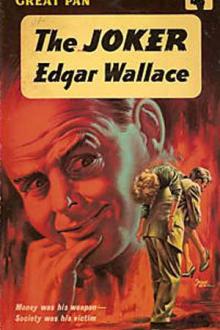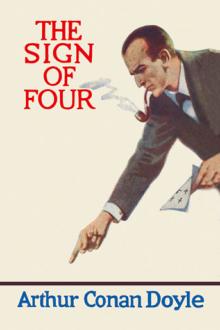The Joker - Edgar Wallace (good book club books TXT) 📗

- Author: Edgar Wallace
- Performer: -
Book online «The Joker - Edgar Wallace (good book club books TXT) 📗». Author Edgar Wallace
able to find a good position for you. Your situation, if you will forgive
my saying as much, is a little tragic. Association with—er—criminals or
people with criminal records has a drugging effect even upon the finest
nature.’
She smiled. ‘In other words, Mr Harlow,’ she said quietly, ‘you’re under
the impression I’m rather badly off and that you would like to make life
easier for me?’
He beamed at this. ‘Exactly,’ he said.
‘It is very kind of you—most kind,’ she said, and meant it. ‘But I have
a very good job in a lawyer’s office.’ He inclined his head graciously.
‘Mr Stebbings has been very good to me—’
‘Mr –-?’ His head jerked on one side. ‘Stebbings—of Stebbings, Field &
Farrow—surely not! They were my lawyers until a few years ago.’
She knew this also.
‘Quite good people, though a little old-fashioned,’ he said. ‘Then of
course you have heard Mr Stebbings speak of me?’
‘Only once,’ she confessed. ‘He is a very reticent man and never talks
about his clients.’
Harlow bit his lip in thought. ‘An excellent fellow! I have often
wondered whether I was wrong in taking my affairs from him. I wish you
would mention that to him when you see him. I understood you were working
in the office of the New Library Syndicate?’
She smiled at this. ‘It’s curious you should say that; their offices are
in Lincoln’s Inn Fields, but next door.’
‘Ah!’ he said. ‘I see how the mistake arose,’ and added quickly: ‘A
friend of mine who knows you saw you going into—er—an office; and
obviously made a mistake.’
He did not tell her who was their mutual friend, and she was not
sufficiently interested to inquire.
This time the knock at the door was more pronounced.
‘Will you excuse me?’ she said. ‘That is my cleaner, and she is rather
inclined to tell me her troubles. I may keep you waiting a little while.’
She left him and he heard the sounds of a door opening, as Jim Carlton
and Elk came back into the dining-room.
‘A very charming young lady that,’ said Mr Harlow.
‘Very,’ said Jim shortly.
‘Women do not interest me greatly’—the Splendid Harlow picked a tiny
thread of cotton from his immaculate coat and dropped it on the floor.
‘They think along lines which I find it difficult to follow. They are
emotional, too—swayed by momentary fears and scruples… ‘
The sound of voices in the passage, one high-pitched and complaining:
‘… what with the fog and everything, miss, it’s lucky I’m here at
all… ‘
A shabby figure passed the open door, followed by Aileen.
‘I suppose you don’t know Ingle, Mr Harlow?’ Jim was examining the
photograph on the mantelpiece. ‘A long-firm swindler; clever, but with a
kink even in his kinkiness! Believes in revolution and all that sort of
thing… blood and guillotines and tumbrils; the whole box of tricks—’
Something made him look round.
Mr Stratford Harlow was standing in the centre of the room, gripping the
edge of a small table to keep him upright.
His face was white and haggard and drawn; and in his pale eyes was a look
of horror such as Jim Carlton had never seen in the face of a man. Elk
sprang forward and caught him as he swayed and led him to a big settee.
Into this Stratford Harlow sank and leaning forward, covered his face
with his hands.
‘Oh, my God!’ he said as he rocked slowly from side to side and fell in a
heap on the ground.
The colossus had fainted.
‘A LITTLE heart trouble,’ said Mr Harlow, smiling as he set down the
glass of water. ‘I’m terribly sorry to have given you so much trouble,
Miss Rivers. I haven’t had an attack in years.’
He was still pale, but such was his extraordinary self-control that the
hand that put down the glass was without a tremor.
‘Phew!’ He dabbed his forehead with a silk handkerchief and rose steadily
to his feet.
Elk was engaged in the prosaic task of brushing the dust stains from his
knees and looked up.
‘You’d better let me take you home, Mr Harlow,’ he said.
Stratford Harlow shook his head.
‘That is quite unnecessary—quite,’ he said. ‘I have my car at the door
and a remedy for all such mental disturbances as these! And it is not a
drug!’ he smiled.
Nevertheless, Elk went with him to the car.
‘Will you tell my chauffeur to drive to the Charing Cross power station?’
was the surprising request; and long after the car had moved off in the
fog Elk stood on the sidewalk, wondering what business took this
multi-millionaire to such a venue.
They evidently knew Mr Harlow at the power station and they at any rate
saw nothing remarkable in his visit.
The engineer, who was smoking at the door, stood back to let him walk
into the great machinery hall, and placed a stool for him. And there for
half an hour he sat, and the droning of the dynamos and the whirr and
thud of the great engines were sedatives and anodynes to his troubled
mind.
Here he had come before, to think out great schemes, which developed best
in this atmosphere. The power and majesty of big wheels, the rhythm of
the driving belts as they sagged and rose, the shaded lights above the
marble switchboards, the noisy quiet of it all, stimulated him as nothing
else could. Here he found the illusion of irresistibility that attuned so
perfectly to his own mood; the inevitable effects of the inevitable
causes. The sense that he was standing near the very heart of power was
an inspiration. This lofty hall was a very home of the gods to him.
Half an hour, an hour, passed, and then he rose with a catch of his
breath, and a slow smile lit the big face. ‘Thank you, Harry, thank you.’
He shook the attendant’s hand and left something that crinkled in the
hard palm of the workman. A few minutes later he drove through
brilliantly illuminated Piccadilly Circus and could offer a friendly nod
to the flickering and flashing lights whose birth he had seen and whose
very brilliance was a homage to the steel godhead.
To be thoroughly understood, Mr Stratford Harlow must be known.
There had been five members of the Harlow family when Stratford Selwyn
Mortimer Harlow was born, and they were all immensely rich. His mother
died a week later, his father when he was aged three, leaving the infant
child to the care of his Aunt Mercy, a spinster who was accounted, even
by her charitable relatives, as ‘strange’. The boy was never sent to
school, for his health was none of the best and he had his education at
the hands of his aunt. An enormously rich woman with no interest in life,
she guarded her charge jealously. Family interference drove her to a
frenzy. The one call that her two sisters paid her, when the boy was
seven, ended in a scene on which Miss Alice, the younger, based most of
her conversation for years afterwards.
The main result of the quarrel between Miss Mercy and her maiden sisters
was that she shut up Kravelly Hall and removed, with her maid Mrs Edwins,
to a little cottage at Teignmouth. Here she lived unmolested by her
relatives for seven years. She then went to Scarborough for three years
and thence to Bournemouth. Regularly every month she wrote to her two
sisters and her bachelor brother in New York; and the terminology of the
letters did not vary by so much as a comma:
“Miss Mercy Harlow presents her compliments and begs to state that The
Boy is in Good Health and is receiving adequate tuition in the essential
subjects together with a sound instruction in the tenets of the
Protestant Faith.”
She had engaged a tutor, a bearded young man from Oxford University (she
deigned to mention this fact to her brother, with whom she had not
quarrelled), whose name was Marling. There came to the ears of Aunt Alice
a story which called into question the fitness of Mr Marling to mould the
plastic mind of youth. A mild scandal at Oxford. Miss Alice felt it her
duty to write, and after a long interval had a reply:
“Miss Mercy Harlow begs to thank Miss Alice Harlow for her communication
and in reply begs to state that she has conducted a very thorough and
searching enquiry into the charges preferred against Mr Saul Marling
(B.A. Oxon) and is satisfied that Mr Marling acted in the most honourable
manner, and has done nothing with which he may reproach himself or which
renders him unfit to direct the studies of The Boy.”
This happened a year before Miss Mercy’s death. When nature took its toll
and she passed to her Maker, Miss Alice hastened to Bournemouth and in a
small and secluded cottage near Christchurch found a big and solemn young
man of twenty-three, dressed a little gawkily in black. He was tearless;
and indeed, his aunt suspected, almost cheerful, at the prospect of being
freed from Miss Mercy’s drastic management.
The bearded tutor had left (Mrs Edwins, the maid, tearfully explained) a
fortnight before the passing of Miss Mercy.
‘And if he hadn’t gone,’ said Miss Alice with tight lips, ‘I should have
made short work of him. The Boy has been suppressed! He hasn’t a word to
say for himself!’
A council was held, including the family lawyer, who was making his first
acquaintance with Stratford. It was agreed that The Boy should have a
flat in Park Lane and the companionship of an elder man who combined a
knowledge of the world with a leaning towards piety. Such was found in
the Rev. John Barthurst, M.A., an ex-naval chaplain.
Miss Edwins was pensioned off and the beginning of Stratford’s
independent life was celebrated with a dinner and a visit to Charley’s
Aunt, through which roaring farce he sat with a stony face.
The tutelage lasted the best part of a year; and then the quiet young man
suddenly came to life, dismissed his worldly and pious companion with a
cheque for a thousand pounds, summoned Mrs Edwins to be his housekeeper;
and bought and reconstructed the Duke of Greenhart’s house in Park Lane.
And thenceforward Mr Harlow’s name began to appear in the records of
important transactions. Family fortunes dropped into his lap. Miss Mercy
had been fabulously rich. She had left him every penny of her fortune,
with the exception of �100 to Lucy Edwins in recognition of her faithful
service, realising that she will not regard this sum as inadequate in
view of the great service I rendered to her.’ Then Miss Henrietta died;
and when the death duties were paid there was the greater part of two
millions. Miss Alice left more. The bachelor uncle in New York died a
comparative pauper, leaving a beggarly six hundred thousand.
Mr Harlow’s house was a rather ugly three-storey building which occupied
a small island site, possibly the most valuable in Park Lane, though the
actual entrance was not in that exclusive thoroughfare, but in the side
street. He opened the door with a key and walked into the hall. The door
to the library faced him. There were some letters on the table, which he
scanned through rapidly, opening only one. It was from Ellenbury; and
just then Mr Harlow was annoyed with Ellenbury; he had supplied erroneous
information about Aileen Rivers, and had made





Comments (0)